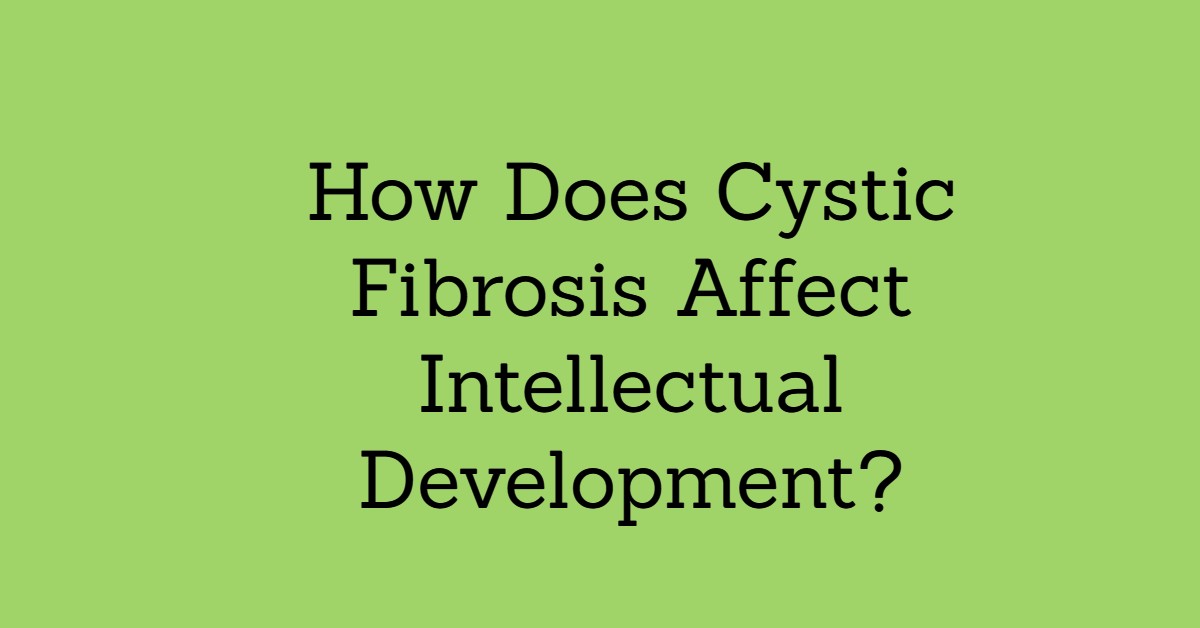How Does Cystic Fibrosis Affect Intellectual Development?

How Does Cystic Fibrosis Affect Intellectual Development? Great question. We provide the answer and all you need to know below.

Cystic fibrosis (CF) is a hereditary lung and digestive condition. CF patients get lung infections often. The CF gene affects the salt-water balance needed to keep the lungs, pancreas, and other organs coated in fluid and mucus. The mucus thickens and sticks. We know that the lungs normally eliminate pathogens from mucus. In CF, thick, sticky mucus and the bacteria, it traps stay in the lungs and potentially infect them.
Thick pancreatic mucus prevents enzymes from reaching the intestines to digest nutrients, especially fats. CF students need to consume more to acquire weight. CF is incurable.
FAQs & Answers on How Cystic Fibrosis Affects Intellectual Development
Can cognitive impairment in CF be reversed or improved?
The extent to which cognitive impairment in CF can be reversed or improved depends on the individual and the severity of the impairment. However, appropriate interventions and support, such as cognitive and neuropsychological testing, educational support, and psychosocial interventions, can help individuals with CF optimize their cognitive functioning and quality of life.
Is cognitive impairment a common feature of CF?
While cognitive impairment is not present in all individuals with CF, studies have suggested that it may be more common in individuals with severe disease and/or frequent hospitalizations.
Can medications used to treat CF affect cognitive function?
Some medications used to treat CF, such as antibiotics, have been associated with cognitive side effects. However, the benefits of these medications in managing the underlying CF disease typically outweigh the potential cognitive risks.
What is Cystic Fibrosis?
Cystic fibrosis (CF) is a multi-systemic, life-limiting hereditary illness that affects respiratory function. Most CF patients are diagnosed by age 2, and the median expected survival rate is 37.4 years. 95% of patients die from lung infection complications. CF is chronic, progressive, and debilitating, requiring numerous daily treatments.
Thus, this sickness needs children and their families to adopt many health-related behaviours along with usual developmental demands. CF children and their families have cognitive, emotional, and behavioural issues due to morbidity and mortality.
This article will discuss psychosocial aspects that affect psychological adjustment and health-related behaviours in newborns, preschoolers, schoolchildren, and adolescents with CF from a developmental viewpoint. Clinical implications will be recognised for developmental and medical milestones.
The impact of chronic illness and hospitalizations on cognitive development in children with CF
Chronic illness can also affect cognitive development in children with CF. The stress of managing a chronic illness can lead to anxiety and depression, which can impact cognitive function. The symptoms of CF, such as coughing, shortness of breath, and fatigue, can also make it difficult for children to concentrate and learn.
In addition, children with CF may miss significant amounts of school due to hospitalizations and illness, which can affect academic achievement and cognitive development. These absences may require additional educational support and interventions to ensure that children do not fall behind academically.
It is important for healthcare providers to be aware of the potential cognitive impacts of chronic illness and hospitalizations in children with CF. Regular cognitive and neuropsychological evaluations can help identify any deficits or challenges and guide appropriate interventions. Additionally, educational support and accommodations can help children with CF achieve their academic potential, even in the face of medical challenges.
How Does Cystic Fibrosis Affect Intellectual Development?
One possible explanation for these cognitive impairments is that the same genetic mutations that cause CF may also affect the development and functioning of the brain. For example, some studies have suggested that the CFTR protein, which is produced by the CFTR gene, may play a role in brain development and function.
In addition, the chronic respiratory and digestive problems associated with CF may also contribute to cognitive difficulties. Frequent infections, hospitalizations, and medical interventions can cause stress and disrupt normal brain function, while poor nutrition due to digestive issues may also impact cognitive development.
It is important to note, however, that not all individuals with CF will experience intellectual or cognitive difficulties. The severity of CF symptoms can vary widely from person to person, and many factors, including genetic and environmental factors, can influence the development and progression of the condition.
Cognitive and neuropsychological testing in CF Patients
There are a variety of cognitive and neuropsychological tests that may be used to assess individuals with CF, depending on their age, cognitive abilities, and other factors. Some common tests include:
- Wechsler Intelligence Scale for Children (WISC): This is a standardized test used to assess cognitive abilities in children ages 6 to 16.
- Kaufman Assessment Battery for Children (KABC): This test assesses cognitive abilities such as memory, reasoning, and problem-solving in children ages 3 to 18.
- Woodcock-Johnson Tests of Cognitive Abilities: This is a battery of tests used to assess cognitive abilities in children and adults.
- Brief Assessment of Cognition in Schizophrenia (BACS): This test assesses cognitive abilities such as attention, working memory, and executive function in individuals with schizophrenia but has also been used in other populations.
In addition to cognitive testing, neuropsychological testing can also be used to evaluate specific areas of cognitive functioning, such as attention, memory, and executive function. These tests may involve tasks such as remembering lists of words, solving puzzles, or completing complex tasks.
Overall, cognitive and neuropsychological testing can provide valuable information about the cognitive abilities of individuals with CF and can help guide appropriate interventions and support to optimize their intellectual development and overall quality of life.
Ways to provide early intervention and Support for cognitive difficulties in Individuals with CF
Cognitive rehabilitation
Cognitive rehabilitation is a structured program that aims to improve cognitive function in individuals with CF. The program typically involves exercises that target specific cognitive skills, such as memory, attention, and problem-solving. Cognitive rehabilitation can be provided by a trained therapist and may be individualized to meet the unique needs of each individual with CF.
Educational support
Individuals with CF who experience cognitive difficulties may benefit from educational support. This can include accommodations in the classroom, such as extra time on tests or the use of assistive technology. Educational support can also involve working with a tutor or academic coach to develop strategies for academic success.
Psychosocial support
Psychosocial support can help individuals with CF cope with the emotional and social challenges of living with a chronic illness. This can include individual or group therapy, as well as support from family and friends.
Medical management
Medical management is an important aspect of early intervention for cognitive difficulties in individuals with CF. This may involve optimizing medication regimens to minimize side effects that can impact cognitive function. It may also involve monitoring and treating infections and other medical conditions that can affect cognitive function.
Psychosocial implications of living with CF and cognitive impairment
Emotional and psychological distress
Coping with the physical and cognitive challenges of CF can be overwhelming and stressful, leading to depression, anxiety, and other mental health issues.
Social isolation
Individuals with CF may need to limit their exposure to others who may have infections, leading to isolation and reduced social interactions. This can further exacerbate feelings of loneliness and depression.
Educational challenges
Cognitive impairment can make it difficult for individuals with CF to keep up with academic demands, leading to frustration and decreased self-esteem.
Employment limitations
Cognitive impairment may limit the employment options and opportunities available to individuals with CF, leading to financial stress and insecurity.
Family dynamics
The emotional and practical demands of managing CF and cognitive impairment can put a strain on family relationships, leading to conflicts and stress.
Conclusion
In conclusion, Cystic Fibrosis (CF) can have a significant impact on intellectual development, particularly in children. Cognitive deficits in areas such as attention, executive function, and working memory have been reported in some individuals with CF, and hospitalizations and chronic illness can also have a negative impact on cognitive development.
However, the impact of CF on intellectual development can vary widely from person to person, and regular cognitive and neuropsychological evaluations are important to identify any deficits and guide appropriate interventions. Psychosocial support and interventions are also critical to help individuals with CF and cognitive impairment cope with the challenges associated with this condition and optimize their overall quality of life.
Recommended:
Male Infertility: Causes, Tests and Treatment
How to Treat Hemophilia in Infants




